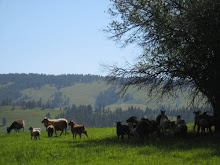
The more I look into vermicomposting, the more it makes sense. Not only are the worm castings, or vermicompost, one of the greatest forms of compost for your garden, but the worms are a great high protein feed for my chickens. The worms compost my vegetable scraps, the chickens eat some of the worms, the chickens poo more great compost and I grow more vegetables with the chicken poo and worm castings. The great circle.
There is a company near me that sells Red Wigglers for $10 a pound. Red Wigglers are the earthworm species most often used for composting. And because you only need two to three pounds of red worms to start most home worm bins, this should be pretty cheap. Of course I could go collect a bunch of night crawlers, but the Red Wigglers seem to be the most efficient composters of garden and kitchen waste.
Redworms can eat about 3 times their weight a week. They reduce the volume of that waste by about two thirds. They mature in 8 weeks & double in biomass every 3-4 months under ideal conditions. That means that if you start with one pound of worms, in three to four months you will have 2 pounds of redworms. In eight months you will have four to five pounds of redworms, etc. 1 mature worm could produce 96 worms in 6 months (2 cocoons X 24 weeks X 2 hatchlings).
Some of the kitchen and garden waste that can be fed to the worms are:
All fruits and vegetables (including citrus and other "high acid" foods)
Vegetable and fruit peels and ends
Coffee grounds and filters
Tea bags (even those containing high tannin levels)
Plate scrapings, moldy bread
Leaves and grass clippings (not sprayed with pesticides)
There are few food wastes that vermicomposting cannot compost, although meat waste and dairy products are likely to putrefy. Green waste should be added in moderation to avoid heating the bin.
Vegetable and fruit peels and ends
Coffee grounds and filters
Tea bags (even those containing high tannin levels)
Plate scrapings, moldy bread
Leaves and grass clippings (not sprayed with pesticides)
There are few food wastes that vermicomposting cannot compost, although meat waste and dairy products are likely to putrefy. Green waste should be added in moderation to avoid heating the bin.
So I guess I'm off to round up some worms.

When I was a child, we raised rabbits and under the rabbit coop, Dad built a pit with rock sides. There we placed the red worms along with our compost. The rabbit coop had a wire bottom so their waste was added too.
ReplyDeleteTwo industries in one. We made a liitle money selling the rabbits and the worms and the extra bonus was the wonderful compost for the garden.
I have been doing the wormy thing for 2 years now. I have been keeping them in a bin in the house, but took a chance this fall and left a few in my compost pile. Was rooting around in it day before yesterday and saw that they made it through our winter! I have a great start with the indoor pile for composted dirt, will use that to amend my garden this spring. Great blog by the way, visit it most everyday!
ReplyDeleteWe have compost worms in bins in the garage during the winter. When the warm weather arrives they go back outside.
ReplyDeleteIt's a great way to process kitchen waste and then we use the castings in the veggie garden.
You won't be sorry if you decide to get some red wrigglers and feed them your stuff.
Where is the place in idaho for $10 worms? :)
ReplyDeleteWhere are $10/lb worms? Can I get the contact, please?
ReplyDelete